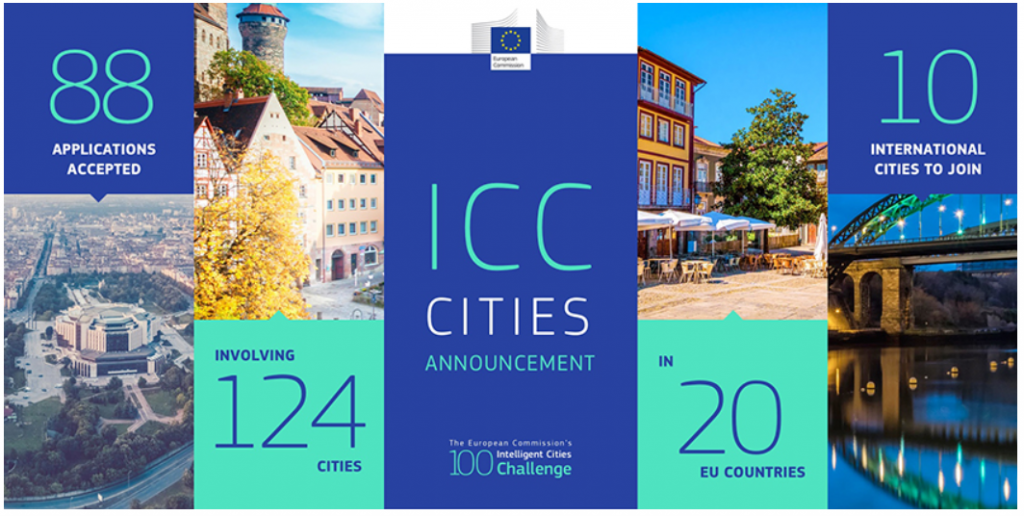The EU Commission has selected Molina de Segura & Cartagena to take part in the “100 Intelligent Cities Challenge”
The “Intelligent Cities Challenge” (ICC), promoted by the European Commission (EC), is a great opportunity for European cities that are evolving towards smart and sustainable cities, taking advantage of advanced technologies to rebuild their economies through sustainable and intelligent growth. The aim of this challenge is to provide the resources and tools to enable capacity building, taking advantage of the potential available in cities to improve the quality of life of their inhabitants and create new opportunities for their business communities. These new opportunities allow a successful implementation of sustainable development strategies for cities, such as air quality, circular economy or intelligent and sustainable mobility, economic and social transformation, industry, etc., thanks to the large community of cities and mentors created. Within this challenge, it also provides the necessary tools to access funds for the development of the cities’ initiatives, such as the European Regional Development Funds (ERDF) and Sustainable Urban Development Strategy (ISUDS).

Source: Intelligent Cities Challenge. Announcement of the cities selected to participate in the challenge.
The cities selected for the challenge will receive expert guidance and mentoring, and they will access to counterpart cities networks as well as to the tools available to promote priority policy objectives and the adoption of advanced technologies.
After a careful selection by the committee, from the 192 applications received, 88 have been selected to participate in the Challenge within the next 2 years, including 8 experienced European cities that will participate as mentors for the rest, such as Barcelona. In total, 124 European cities will participate in the challenge.
Among them, 16 Spanish cities have been selected for the challenge, among which are the cities of Molina de Segura and Cartagena, located in the Region of Murcia. Within the business ecosystem of the region, HOPU is providing its support to both cities as an expert in IoT solutions and services for the creation of smart and sustainable cities by addressing the digital transformation and incorporating new open technologies. These cities will address their most important local challenges.
Cities are aware of their specific urban development objectives
The city of Molina de Segura will focus on waste management and the circular economy, efficient management of water and water systems, smart and ecological mobility and transport, and support for public safety, including other challenges related to e-government, social inclusion, climate change, public welfare and industry. So far, HOPU has contributed to the development and digitalization of the services of this city, solving existing challenges in the local administration during the pandemic crisis thanks to the development of a new Virtual tax collection Office, which ensures the continuity of municipal services without implying any danger to the health of its inhabitants. In addition, the new intelligent platform of the city based on FIWARE is in full development, which will allow the scalability of services and digitization of the rest of municipal services.
On the other hand, the city of Cartagena will focus its efforts on its challenges related to smart and sustainable tourism, mobility and intelligent and ecological transport; e-government, digitalization of public services, and the growth of startups, SMEs, and the social economy, also addressing the efficient use and management of natural resources as well as disaster management and climate resilience. HOPU has contributed to the digitization of services of different city verticals based on sustainability, developing the intelligent city platform based on FIWARE and CEF Context Broker and deploying networks of air quality sensors in its streets and intelligent irrigation management solutions in its parks and gardens, obtaining the international recognition “Le Monde” 2020 for urban planning.
Cartagena experience with HOPU from HOP Ubiquitous on Vimeo.
Core expert support for candidate cities
The support of the business and institutional ecosystem has been crucial in supporting the success of the candidate cities’ challenges. In this context, international bodies, such as OASC, and technology-based institutions, such as Alastria and FIWARE, have corroborated their interest and commitment, promoting this initiative as well.
Furthermore, among the companies in the IoT sector that have offered support, HOPU is highly committed, offering efficient solutions for different city verticals, totally aligned with the current standards and regulations, as well as with the Sustainable Development Goals (SDG), promoted by the United Nations (UN).
The great news has been spread in different media, such as the digital newspapers esmartcity.es and murcia.com. The Councillor for Information Technology of the City Council of Molina de Segura, Juan Antonio Cantero Nicolás, which is responsible for the candidacy, has expressed his gratitude for the support received, dedicating a few words to the business ecosystem that has given its support in the candidacy: “I would like to take this opportunity to show my most sincere gratitude to all the companies, organizations and entities that have express their interest in supporting us during this exciting adventure”.
The challenge started in September 2020
The programme, which started in September 2020, will last 30 months and will include more than 100 days of local visits, events, and activities to support participant cities. Through its action-oriented and collaborative approach, this challenge will offer cities a unique opportunity to:
- Identify local strengths as well as the real priorities and needs of the local environment by defining their strategic objectives and implementation roadmaps.
- Participate in lasting collaborations to co-design and co-create a joint open data platform as an EU marketplace for urban solutions and joint investments/purchases.
- Learn and share experiences between counterpart cities and local and international mentors.
